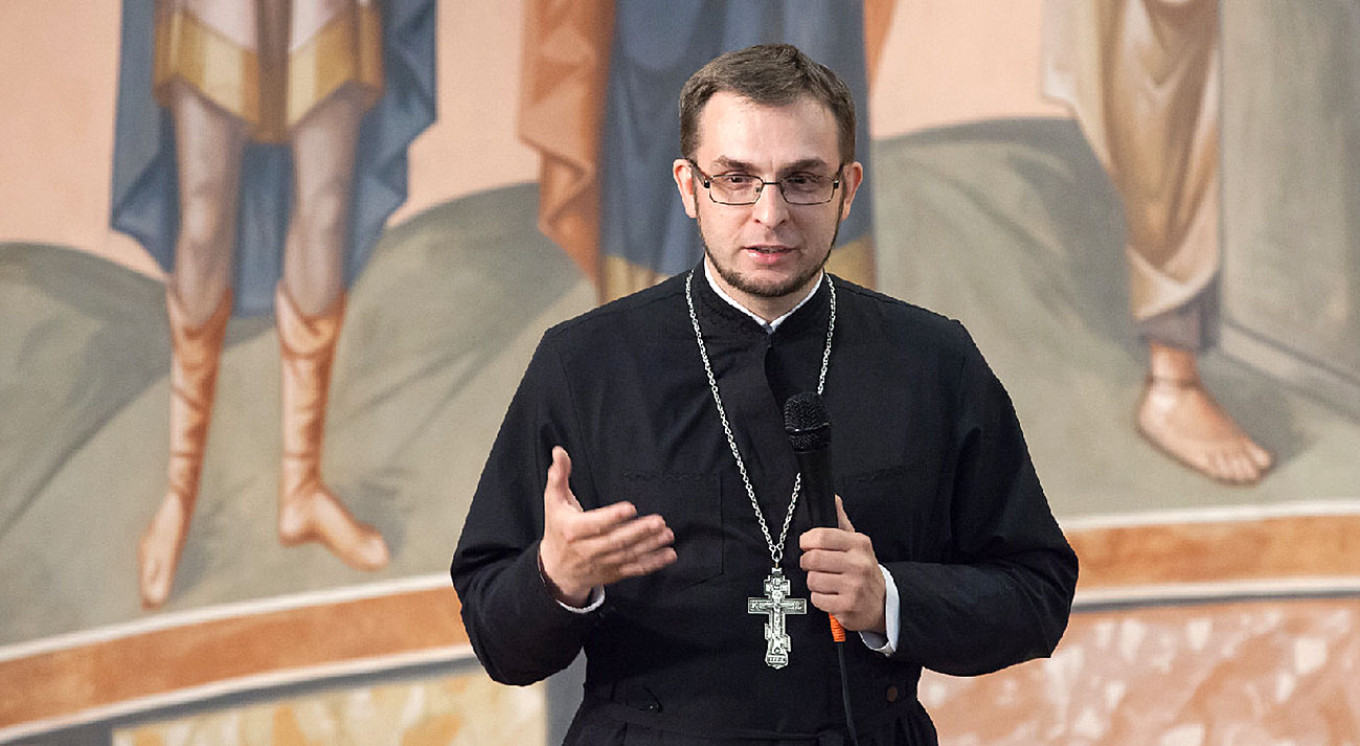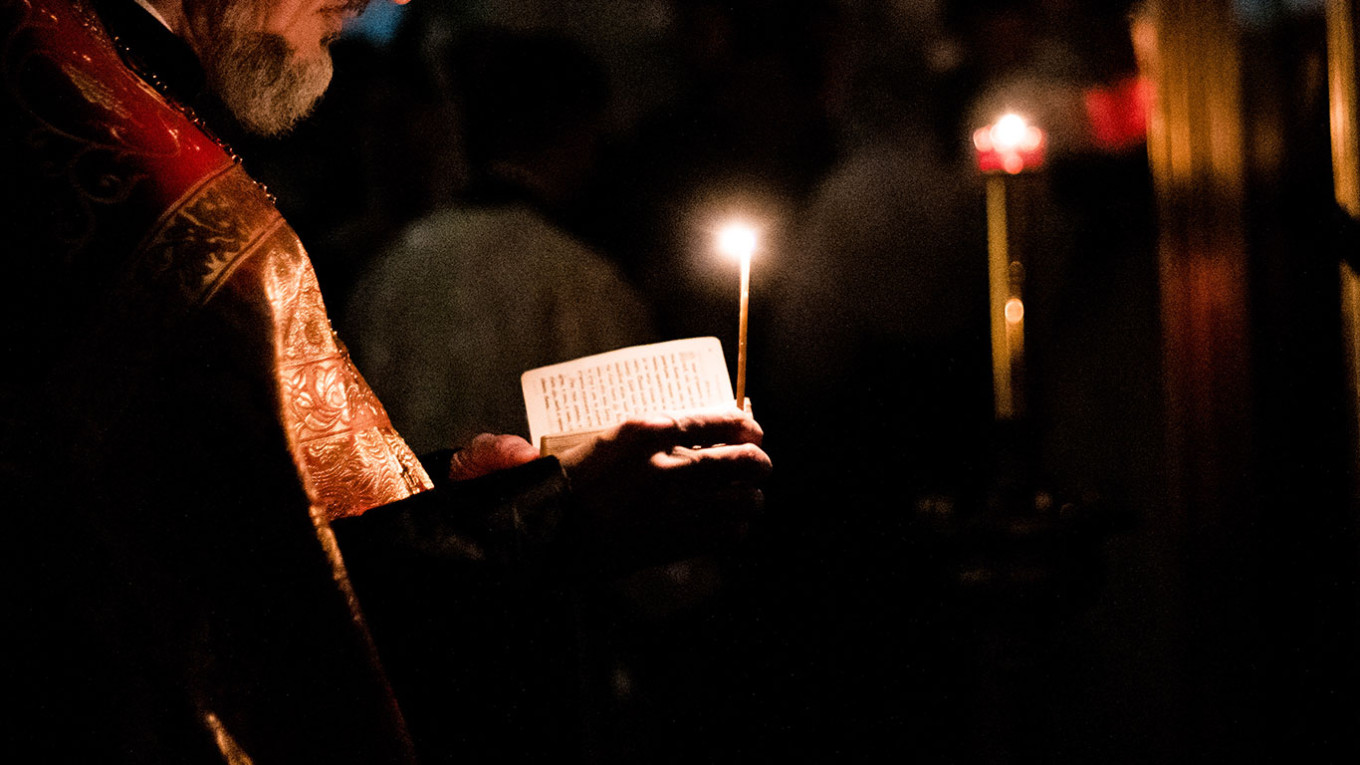When Father Alexei Volchkov signed an open letter to the Russian government in March 2022 calling for peace and an end to the war in Ukraine, he knew there would be backlash.
“What happened was inevitable, really,” he told The Moscow Times. “I was severely reproached by people who were close to me. Some thought I had betrayed them. But I maintain that this signature is one of the most spiritually correct things I have done in recent years.”
Volchkov, who signed the letter alongside 300 other priests, scholars and preachers, now resides outside of Russia as a result of his anti-war stance.
The priest believes he got off lightly compared to many of his fellow signatories, many of whom have been swept up in a wide-reaching crackdown on dissent which has ratcheted up as the war has dragged on.
The Russian Orthodox Church has ardently propagated the Kremlin’s ideology surrounding the offensive in Ukraine, painting it as a “holy war.” Patriarch Kirill, a longtime ally of President Vladimir Putin, said in the early days of the war that “sacrifice in the course of carrying out your military duty washes away all sins.”
Volchkov said the majority of Russian priests do not share this view.
“A relatively small number of representatives speak on behalf of the Russian Church in support of the war,” he said. “Most priests, of which there are tens of thousands, don’t express their opinions publicly. It’s hard to know how to interpret this silence.”
Religious anti-war organizations have gained traction in recent months, aiming to both unite and support anti-war Russian priests as well as provide an alternative narrative to the one being put forward by the Russian Orthodox Church leadership.

One such organization, which aims to bring together anti-war Russian, Ukrainian and Belarusian priests, is the Christians Against War movement. The activist group was founded after the full-scale invasion of Ukraine began, and its website was blocked in Russia in September.
“We are trying to make space for an alternative Orthodoxy,” said Natalia Vasilevich, a Belarusian theologian and founder of Christians Against War. “Some people in our team are well-known in the Orthodox world, and we try to bring them together.”
“While we don’t think we can change Russia or Russian Orthodoxy completely,” Vasilevich said, the movement hopes to “support and bring together those [priests] who have been persecuted.”
Kordochkin, along with other Russian emigre priests, recently launched a project called Mir Vsem (“Peace Unto All”), which he said to “tell the stories of Russian priests who have suffered for their anti-war position.”
“We aim to help in a real way, by providing financial support to priests who have lost their income as a result of their political position. We also want to attract attention. It is important that the public knows about these people and that they exist. When people say that the church supports the war, we must remember that many, in fact, most, do not.”
“We [anti-war Russian priests] are geographically separate, but we are all in contact with and support one another.”
Kordochkin told The Moscow Times that anti-clerical moods remain high among the wider Russian emigre community, as people “associate the church with the government.” The new resource is intended to give the “full picture” and start to cure the “collective narcissism” suffered by the Russian church with a “Christian message of repentance.”

But speaking out against the war still carries significant risks for many priests.
Andrei Kordochkin, a priest at Madrid’s St. Mary Magdalene Orthodox Cathedral, has lived and worked in Spain for 19 years and co-authored the open letter last March.
“The letter is now one and half years old, but the consequences for those who signed it are still coming out,” he told The Moscow Times in a telephone interview.
“Originally, there had been no official reaction from the church, as they wanted the letter to go unnoticed,” he said. “But the church later condemned it saying that it was political and that the church is supposed to remain outside of politics. The church is about unity and this caused division.”
The letter was criticized by liberal-leaning activists for being “too soft” in its condemnation of the war, avoiding the use of words like “aggression” and “invasion.” However, Kordochkin insisted that “the letter was not meant to judge or condemn, it was a pastoral message calling people to repentance.”
In February, he was suspended by Patriarch Kirill for three months over his anti-war stance, though he said he had been experiencing backlash in his congregation for some time.
“Some Ukrainians left because for them it was not acceptable to remain in a church that was under the Moscow Patriarchate,” he said. “Other members of the congregation also left because they disagreed completely with my position. This was not just a result of the letter. I have been speaking out, especially on social media, for some time.”
Church jurisdiction plays a major role in keeping priests from speaking out, said Ksenia Luchenko, a visiting fellow at the European Council on Foreign Relations.
“If you are persecuted by your own church [for your political position], you are banned or defrocked, and cannot serve in the Moscow Patriarchate anymore,” she said.
As a result, many priests go abroad to retain their canonical status, somewhere where the Ecumenical Patriarchate or other church jurisdictions exist.
“But the FSB [Federal Security Service] remains particularly interested in these anti-war priests, and many end up very lonely and insecure,” Luchenko said. “They lose their jobs, income, and the means to support their families.”
Some Russian emigre priests struggle when trying to settle into new European parishes as “people of more liberal and democratic views do not trust the Russian Church and want to keep as far away from its priests as possible,” said Vasilevich of Christians Against War.
She believes this is part of why no united anti-war Russian Orthodox movement has yet emerged.
“Pro-Ukrainian activists sometimes protest against Russian anti-war priests, making it hard for these priests to voice their position even when abroad — they are afraid that activists may try to target them in order to prove that ‘there are no good Russians’,” she said.
Despite the progress made by new religious anti-war groups, priests and experts remain largely pessimistic about the future of the Russian church.
“The Russian Orthodox Church will not survive Putin,” Luchenko said, believing that the moral authority of the church has been severely undermined and that “the whole structure will fall apart” as a result.
“The church mirrors the society of which it is a part,” said Andrei Desnitsky, a philologist and longtime expert on the Russian Orthodox Church. “If it is a dictatorship, the church will be very patriarchal. If the society is democratic, it will be accompanied by a democratic church. If the post-Putin society is no different or worse than Putin, the church is unlikely to improve.”
Desnitsky also feared that the church could “disintegrate entirely” in the future as a result of its position on the war against Ukraine.
“When the state stops interfering and oppressing alternative narratives, there will be more options for Christians, different patriarchates that they can attend,” he said.
In which case, the communities and relationships being formed by priests now may play a “significant role” in the future, Desnitsky said.
“After what has happened, and after seeing how people have behaved, many will never be able to work together again, to serve, to be part of the same parish,” Volchkov said. “I do not know when and if these wounds can be healed.”





